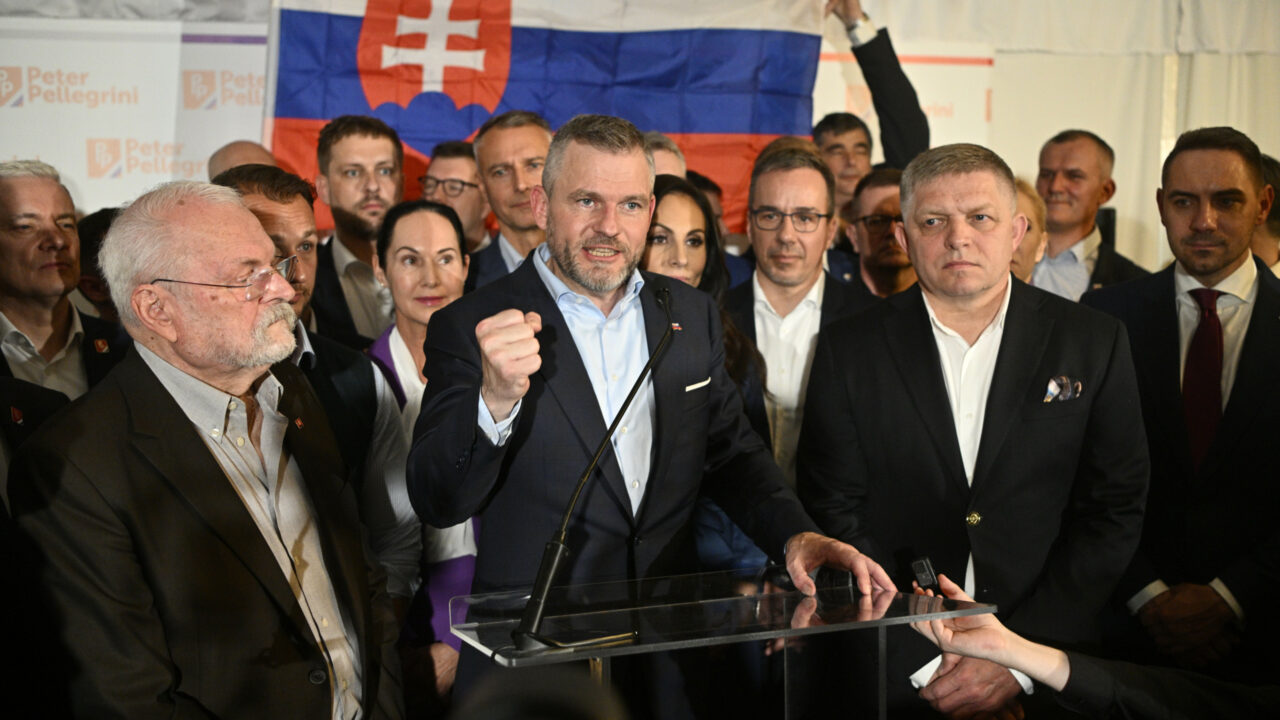Handle with care: The risks of punishing Slovakia’s new government
After Slovakia elected a populist president and a pro-Russian prime minister in a span of six months, the EU may be tempted to punish Bratislava. But this would risk making matters worse
Another election in Europe, another advance for the Kremlin – so goes one popular interpretation of the Slovak presidential election last month. And as with every cliché, it contains some truth. The winner of the election, Peter Pellegrini, has refused to say that he would come to the aid of NATO allies and has also called for “peace talks with Moscow”, much as Donald Trump does. Though Pellegrini presents himself as pro-EU and pro-NATO, he has actively courted – and was rewarded with the support of – the hard pro-Russian wing of Slovak politics. The Kremlin could hardly have hoped for a friendlier outcome.
Seen through this prism – and given the Orban-like attacks on EU institutions by prime minister Robert Fico, Pellegrini’s ally – some European politicians have naturally inclined to isolate or remove another pro-Russian government before it spreads. Norbert Röttgen, member of the German Bundestag, has suggested that the European Union should show Slovakia the door. Others have simply called for the immediate suspension of EU funds. This would satisfy the understandable urge to “do something”. But such an approach risks unnecessarily condemning Slovakia to Hungary’s fate – an angry, isolated member-state lashing out at the rest – thus only compounding Brussel’s problem.
Slovakia is not a lost cause. It is poised between two possible futures. A wise response from the EU would seek to maximise the odds of a tilt back to the West, not push Bratislava further away from it.
A wise response from the EU would seek to maximise the odds of a tilt back to the West, not push Bratislava further away from it
The presidential election shows that Slovakia is deeply divided, but also fairly evenly divided. The gap between the winner and the challenger was the tightest since Slovakia brought in the direct election of a president. Ivan Korcok, the unsuccessful candidate, received more votes than the outgoing and staunchly pro-Western president Zuzana Caputova did five years ago. This mirrors the outcome of the parliamentary election in September last year, which produced a razor-thin majority of four for Fico’s populist coalition.
Even many Pellegrini voters reject the idea of following Orban down the route of confrontation with Brussels. While he attracted extremist votes, his traditional base is voters dissatisfied with the confrontational Fico and looking for a kinder and less polarising alternative. Pellegrini’s success in the election lies precisely in being able to gain votes from two very different electorates.
Talk of showing Slovakia the door so closely after the election merely serves to mobilise the Eurosceptic wing of Slovakian politics. It seems to confirm their belief that the EU is an elitist institution that ignores the popular will. At another point in Slovakia’s history, the threat of expulsion from the EU was indeed successfully used to rally the pro-Western camp: in 1988, then US Secretary of State, Madeleine Albright, called Slovakia, then under the populist government of Vladimir Meciar, “the black hole of Europe”, and tossed it from the group of countries moving towards NATO membership. The shock helped launch an opposition movement that elected the reformist Mikulas Dzurinda. But that was a different Slovakia and a different Europe. The West seemed invincible then and everybody wanted to be a part of it – Slovakia was an insecure start-up afraid of being left behind. This time, however, the right-wing populists have successfully sold the idea to a sizeable part of the population that the sovereign thing to do is resist the EU. The threat of expulsion may once again help energise the democratic opposition, but it will likely fuel Slovakia’s Eurosceptics even more.
The case for suspending EU funds is a different matter in that it is not merely a political choice. There are rules in the EU, including the powerful conditionality regulation, that mandate withdrawal of money if it is not spent transparently due to rule of law failings. If the commission concludes that this is the case, it has little choice but to act lest it be sued for inaction. If it does move to suspend funding, the EU should clearly communicate the grounds for suspension and seek to distance itself from Fico’s and Pellegrini’s inevitable misrepresentation as being unfairly punished for their electoral successes.
Ultimately, however, the burden of keeping Slovakia firmly within the EU and NATO falls not on EU institutions or member states but on the Slovak opposition. This will not be easy, given the low spirits following Korcok’s loss and Fico’s win in the parliamentary election six months prior, but Slovakia’s opposition can take heart in the sheer size of their vote. They will also be abetted by the new government’s incompetence. In its first few months in power, it has already managed to so bungle public finances that Slovakia now pays the second highest interest rate of all Eurozone countries. Slovaks also have some of the most expensive mortgages in the EU. The government will likely counter by inventing foibles of Western conspiracies but, as the saying goes, you can fool some people some of the time but not all people all of the time.
There is little that the rest of Europe can do to help Slovakia’s opposition in this task, and much that it can do to hurt. Pro-European Slovaks appreciate the sentiment behind the calls for expulsion – no one is more incensed about the direction that Slovakia has taken than half of Slovakia’s population. But there is every reason to believe that the course is reversible. Until proven otherwise, the EU should let those in Bratislava focus on righting what’s wrong.
The European Council on Foreign Relations does not take collective positions. ECFR publications only represent the views of their individual authors.



